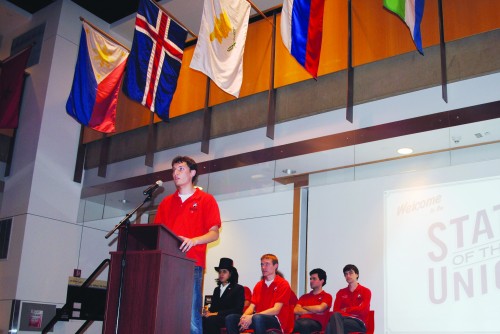 THE RPI STUDENT SENATE PRESENTS their various committees, relative projects, and goals for the Institute.
THE RPI STUDENT SENATE PRESENTS their various committees, relative projects, and goals for the Institute.On Monday, RPI’s Student Senate held its second annual State of the Union presentation. The chairs of each committee gave overviews of their respective committees, providing students with insight into how the Senate works.
The Web Technologies Group, headed by Mark Anderson, focuses primarily on maintaining and improving the online resources currently available to students, such as Concerto and website resources both for the Senate and for other student-run organizations.
Working in conjunction with the WTG is the Senate Communications group, chaired by Russell Brown ’14. This committee’s basic purpose is to inform students of actions taken by the Senate and about changes in policy. They do this mainly through the use of posters, the Senate website, and events like “Meet Your Senator,” during which senators were spread around campus to answer questions.
There also exists the Rules and Elections Committee. Its chair, Reilly Hamilton ’12, explained that R&E handles all aspects of student elections, both for freshmen elections and GM Week. Their goals include increasing voter turnout and streamlining the process by reducing the amount of postering involved with campaigning. They will also strive to consolidate the Student Handbook which, they state, is more obscure than need be.
Andrew Labunka ’13, chair of the Academic Affairs Committee, described AAC as the “go-to committee for improving the quality of education.” For example, when several students gave complaints about Introduction to Biology class the AAC brought these concerns to the administration to attempt to address the purported problems.
The Finance, Facilities, and Administration Committee, headed by Paul O’Neil ’14, focuses primarily on making sure all physical facilities are optimal for student experience. This includes communicating with Sodexo (among other companies), hosting events like the Public Safety Forum, and assisting with projects such as the CII Plaza construction. They also check to see if the Institute is using money in ways they deem “proper.” Similarly, the Student Life Committee claims to ease the student experience and inform students of topics such as the Clustered Learning Advocacy and Support for Students initiative and the judicial board.
The Advocacy, Community, and Advancement Committee—according to its chair, Anasha Cummings ’12—acts to maintain relations with the community of Troy to benefit both the RPI community and the residents of the city. This involves working closely with politicians, both at the city council and mayoral levels.
President of the Union Nikki Gallant ’12 briefly described the functions of the Executive Board, especially in terms of the Union’s budget and how it should be spent to provide maximum benefit to the majority of RPI students. Lee Sharma ’12, the Grand Marshal, then described what she believes to be the core values of the Student Senate. It’s role, she said, is to “protect and enhance the student experience through legislation and initiatives.”
After each member of the Senate had made his or her presentation, the floor was opened for general discussion and questions from the students who had attended the event. The first issue brought up involved the recently established Alliance for Responsible Governance. Speaking for the Senate as a whole, the GM stated that all efforts had been made to convey ARG’s concerns to the Institute’s administration. The Senate’s official statement, she added, will be published in a report set for release on November 14. Another student raised a related question, asking what actions students may or may not take when faced with a particular issue. The GM’s response was that students should first find out the facts. If the concern has not been addressed after gathering this information, students have a few options. They may talk to the administration to have their concerns heard, they may attempt to present the opinion of the student body through a referendum, or they may petition the issue in question—provided they fill out a form for peaceful demonstration.
Another area of concern for the students was the departure of former Chief of Staff Laban Coblentz. The GM simply reiterated the concept that the situation surrounding his leaving was a personal matter. She emphasized that Coblentz should be the only one with the authority to discuss the issue with the public. Otherwise, she urges that the student population should respect his privacy. Additionally, the GM would like the RPI community to focus on figuring out how to fill the void Coblentz left, suggesting that, when they have questions, students communicate with Vice President for Student Life Timothy Sams, Director of the Union Joe Cassidy, or the GM herself.
A final concern of the attending students was the communication of information, or lack thereof. Particularly, the question of whether a central forum for discussion would be considered. At the moment, the Senate mentioned, there is no such setup, but “it is definitely something to look into.” For now, they say, students have access to resources such as Concerto. And, the Student Senate urges the student body to e-mail justask@rpi.edu with any questions regarding RPI-based concerns, including who to go to and what options are available to those concerned. Information about such topics as construction and maintenance status of facilities around campus can be found in the Senate minutes, to which all students have access. The GM also asks that students not hesitate to e-mail gm@rpi.edu for help with any similar problems.
